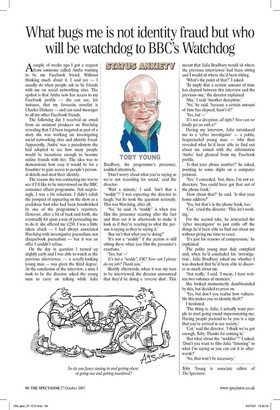What bugs me is not identity fraud but who will be watchdog to BBC's Watchdog
TOBY YOUNG couple of weeks ago I got a request rom someone called Amba wanting to be my Facebook friend. Without thinking much about it, I said yes — I usually do when people ask to be friends with me on social networking sites. The upshot is that Amba now has access to my Facebook profile — she can see, for instance, that my favourite novelist is Charles Dickens — and can send messages to all my other Facebook friends.
The following day I received an email from an assistant producer on Watchdog revealing that I'd been targeted as part of a story she was working on investigating social networking sites and identity fraud. Apparently, Amba' was a pseudonym she had adopted to see how many people would be incautious enough to become online friends with her. The idea was to demonstrate how easy it would be for a fraudster to gain access to people's personal details and steal their identity.
The reason she was contacting me was to see if I'd like to be interviewed on the BBC consumer affairs programme. Not surprisingly, I was a bit reluctant. I didn't relish the prospect of appearing on the show as a credulous fool who had been hoodwinked by one of the programme's reporters. However, after a bit of back-and-forth, she eventually hit upon a way of persuading me to do it: she offered me £250. I was a little taken aback — I had always associated Watchdog with investigative journalism, not chequebook journalism — but it was an offer I couldn't refuse.
On the day in question I turned up slightly early and I was able to watch as the previous interviewee — a scruffy-looking young man — was given the third degree. At the conclusion of the interview, a man I took to be the director asked the young man to carry on talking while Julia Bradbury, the programme's presenter, nodded attentively.
'Don't worry about what you're saying as we're not recording for sound,' said the director.
'Wait a minute,' I said. 'Isn't that a "noddy"?' I was expecting the director to laugh, but he took the question seriously. This was Watchdog, after all.
'No,' he said. A "noddy" is when you film the presenter reacting after the fact and then cut it in afterwards to make it look as if they're reacting to what the person is saying as they're saying it.'
'But isn't that what you're doing?'
'It's not a "noddy" if the person is still sitting there when you film the presenter's reactions.'
'Yes, but —' 'It's not a "noddy", OK? Now can I please do my job? Thank you.'
Shortly afterwards, when it was my turn to be interviewed, the director announced that they'd be doing a 'reverse shot'. This meant that Julia Bradbury would sit where the previous interviewee had been sitting and I would sit where she'd been sitting.
'What's the point of that?' I asked.
'To imply that a certain amount of time has elapsed between this interview and the previous one,' the director explained.
Aha,' I said. 'Another deception.'
'No,' he said, 'because a certain amount of time has elapsed, hasn't it?'
'Yes, but —' 'It's not a deception, all right? Now can we kindly get on with it?'
During my interview, Julia introduced me to a `cyber investigator' — a polite, bespectacled young man — who then revealed what he'd been able to find out about me armed with the information Amba' had gleaned from my Facebook profile.
'Is that your phone number?' he asked, pointing to some digits on a computer printout.
'Yes,' I conceded, 'but, then, I'm not exdirectory. You could have got that out of the phone book.'
'How about that?' he said. 'Is that your home address?'
'Yes, but that's in the phone book, too.' 'Cut,' cried the director. 'This isn't working.'
For the second take, he instructed the `cyber investigator' to just rattle off the things he'd been able to find out about me without giving me time to react.
'It's just for reasons of compression,' he explained.
The polite young man duly complied and, when he'd concluded his 'investigation', Julia Bradbury asked me whether I was shocked that he'd been able to discover so much about me.
'Not really,' I said. 'I mean, I have written two volumes of memoirs.'
She looked momentarily dumbfounded by this, but decided to press on.
'Yes, but don't you realise how vulnerable this makes you to identity theft?' I hesitated.
'The thing is, Julia, I actually want people to start going round impersonating me. Having people pretend to be you is a sign that you've arrived in our society.'
'Cut,' said the director. 'I think we've got enough, Toby. Thanks for coming in.'
'But what about the "noddies"?' I asked. 'Don't you want to film Julia "listening" to what I'm saying so you can cut it in afterwards?'
'No, that won't be necessary.'
Toby Young is associate editor of The Spectator.


































































 Previous page
Previous page